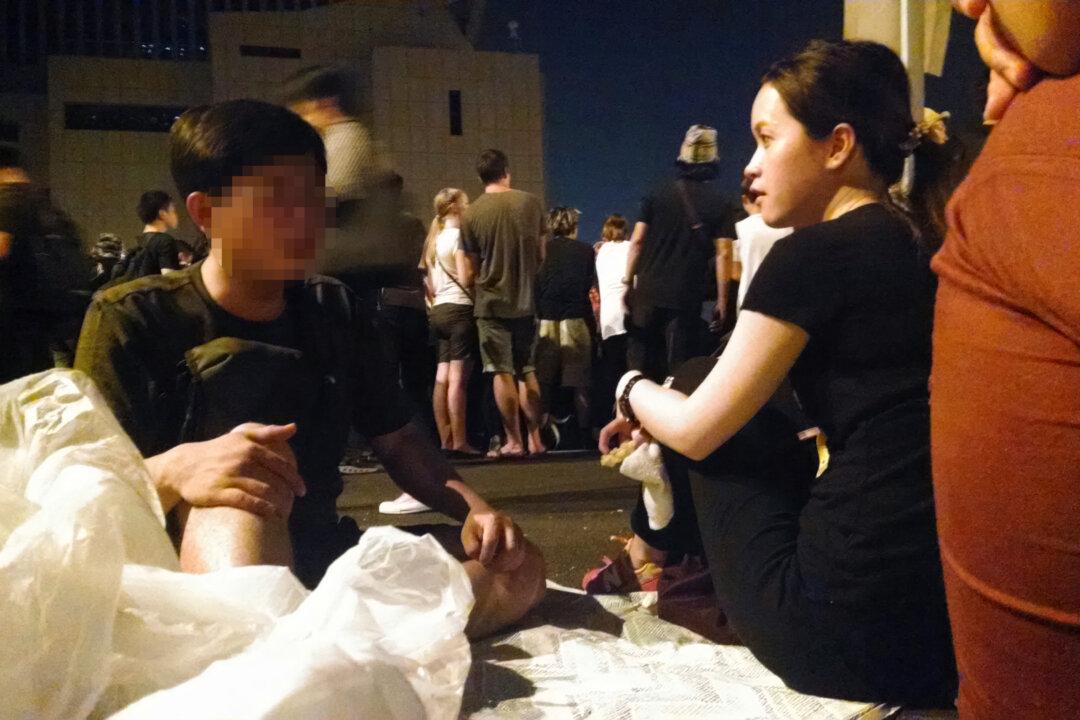HONG KONG—In a Cantonese-speaking environment, where sudden glottal stops and seemingly random “laaa” sounds abound, the simple tones of “yi, er, san” — “one, two, three,” in Mandarin Chinese — are enough to turn any head.
The mainland Chinese who wander through Hong Kong’s occupied zones, where students and activists have taken over roads and set up camps, often try to avoid drawing attention to themselves—so the language they speak is sometimes the only way to pick them out.
But over the last couple of weeks many of them have trundled through, taking photographs of one another (hence the one-two-three countdown), talking politics with Hongkongers, and soaking in the atmosphere of a vibrant people’s movement.
Since late September, thousands of Hong Kong students and young people have occupied key streets in the city in an attempt to get the government to engage in talks about introducing a greater level of democracy for the election of the city’s chief executive, effectively a mayoral role.
Most recently they have set up tents at the key site near government offices, called Admiralty. Works of art, ad hoc “democracy classrooms,” speeches, movies, free food, recycling centers, and more, have all sprung up in the encampment.
It was this scene that greeted mainland visitors, who are used to an environment that is at once far more regimented and more lawless.
And all of the mainlanders that spoke with Epoch Times were clear that such an event could never happen in China.
‘Quality People’
“It’s all so novel, so surprising to me,” said Mr. Li, who runs a business in Shenzhen, and came to Hong Kong for a few days of holiday. “We would never hear about this in China,” he said.
“The Communist Party would crack down on a movement like this. The ordinary folks can’t get past the Party.”
He felt that the demands of protesters were “70 percent reasonable,” but added that many mainland Chinese already think that Hong Kong has got it pretty good.
“They think: you’ve already got a bit of democracy, why do you want more?”
A recent decision by the Chinese Communist Party’s rubber-stamp legislature allowed universal suffrage in Hong Kong, though in a highly straitjacketed form, where voters will only be able to elect from two or three candidates screened by Beijing. It is this measure and similar actions by Beijing that, in part, triggered the outpouring to the streets, seeking greater input in the selection of Hong Kong’s leadership.
Mr. Li thought that the operations of the encampment itself were highly impressive. The movement has set up a semi-permanent camp over a 12-lane expressway near government headquarters. Some protesters live there almost full time.
“Hongkongers are quality people,” he said, using the Chinese word suzhi, which refers to class, character, behavior, and breeding. “If you got mainlanders to do something like this, it would be chaos. People absorb the beliefs of the political system they are in. In China, there’s no moral bottom line. Everything is now focused on the economy, and there’s no morality.”
Song Shubin, a Chinese businessman, was similarly impressed with Hongkongers and their movement. Song, who had a local Hong Kong host, buttonholed a reporter sitting on a road separator.
“The Hong Kong people really are extremely civilized,” Song said, observing how steps and signage had been put up around the site, channeling the flow of foot traffic. “I’m a person who pays attention to detail,” he said with a flourish. “Look around you right now. Do you see a single cigarette butt on the ground? In China, there would be cigarettes everywhere.”
Song said that he had made a great deal of money in China, and now simply traveled the world. His host, Raimond, a Hong Konger described him as a “member of the Chinese elite.” Song said that he was not worried about his name being used—though demurred at the idea of a photograph appearing in print.
Dark Motives
But all other mainland Chinese who spoke to the Epoch Times did not wish to use their full names, because of the potential political repercussions they may face in China for speaking to foreign media about what some officials in China have called a “color revolution” instigated by “foreign forces.”
One man did not even give a chance to share his views at length. “I’m deeply moved,” was all he was able to say, when asked about his impressions by a reporter, before he was yanked away by the sleeve by a younger companion.
Another young man was more forthcoming, sitting down to hash out competing political philosophies and the proper configuration of democracy in Hong Kong for over an hour with a young Hong Kong woman under a gazebo. The conversation took place in Mandarin in the presence of an Epoch Times reporter.
“We mainlanders really envy you,” he said, squinting. “It’s a very complicated situation. I understand you want democracy, but you have to look at the overall situation in Hong Kong, and the history, and you'll find that it’s very complicated with many difficulties. Especially with the central government. Many problems.”
Their meandering discussion reached no conclusion, except perhaps that the young man, who at one point disrupted the tete-a-tete to stand up and avoid being filmed by a roving television camera, had a much more cynical vision of politics and the world than the idealistic Hongkonger he spoke with.
“In China the Party leader will tell you what to do, and you have to do it. Nowhere in the world is fair. There are always hidden interests,” he said. This idea—the darkness of human motive, the futility of resistance—was a recurring theme through their chat. “If you can have enough to eat and live in peace then that’s enough,” he concluded.
“That’s surviving, not living!” responded his impassioned conversation partner. “This isn’t about whether we can buy an iPhone 6, but for our future generations.”







